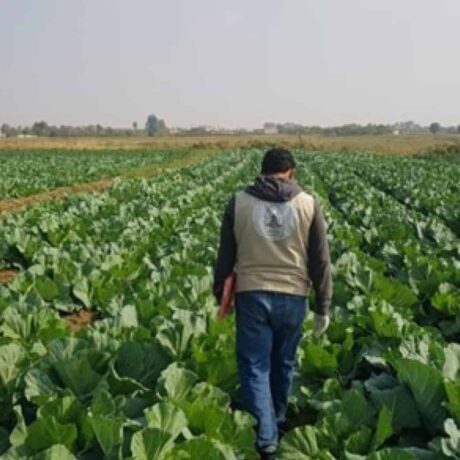Fateem Ahmad Al-Hussein and her family were struggling to make ends meet even before war broke out in Syria. When ISIS arrived in her village in the northeastern province of Deir Ezzor, Fateem, her husband and their children fled. Unable to survive in the overcrowded and under-resourced Al-Hasaka City, they returned to their village a few months later.
trágicamente, on their return Fateem lost two of her children to ISIS terrorists. Like many Syrians, she had no recourse and was left to care for her grandchildren in the village.
Several years later, the region was liberated, and a Syrian NGO called Bedaya came to her village to offer agricultural services. Bedaya, a grantee organization of the Agricultural and Livelihoods Stabilization Partnerships (ALSP) programa, selected Fateem for a training program in tunnel gardening.
Tunnel gardening offers an efficient and low-cost way to grow vegetables in a difficult, desert environment. After learning management and growing techniques, Fateem started growing cucumber, zucchini, okra and eggplant for her family’s consumption and to sell at market.
She’s been expanding ever since, quadrupling her income and adding five more vegetables to her repertoire. Ahora, she covers her family’s needs and pays for her grandchildren’s schooling.
Growing vegetables became much more than a livelihood, ella dice. Her garden has become a source of psychological stability and an emotional release.
Locally driven development
Fateem is one of over 20,000 people in Northeast Syria that ALSP has reached through livelihoods support, skills-training and other agricultural activities.
Funded by the German Federal Foreign Aid office and implemented by Creative, ALSP provides grants and technical support to community-based organizations like Bedaya in target communities in Northeastern Syria. Working to improve agricultural productivity and bring more economic opportunities to people in the region, the organizations are engaged in a range of activities, from small-scale vegetable production like Fateem’s garden to commercial olive tree cultivation, and from beekeeping to sewing clinics.
ALSP is unique in the region in that it works in remote villages that other international organizations have yet to access. para hacer esto, they rely on local staff who know these communities and their dynamics.
“In Deir Ezzor, most of [the people we work with] are returnees and they haven’t had assistance for a long time,” says Hind Audsley, Chief of Party for ALSP. “For an NGO to be successful they really need to understand the local dynamics and have some sort of a connection with local leaders to gain access to and approval to provide assistance to returnees since this can cause conflict within the host community.”
Fostering local relationships goes a long way in building trust after a decade of war. ALSP and its local NGO partners rely on practical assistance in the form of workshops and agricultural support to lay a foundation for future work and development in the region.
«But because of the war and ISIS they lost many things, so we start to revive their business and their lands,” Mesud Ahmed, Senior Program Manager for ALSP.
Skills training in refugee camps
In addition to working in rural villages, the program also focuses on several of the region’s camps, which are now home to thousands of displaced persons.
Allá, ALSP partners with local organizations to offer vocational training in areas such as computer repairs, home repairs, car mechanics, house carpentry, and sewing, providing people the opportunity to learn a skill to generate income for their families.
For women like Iman Ali Al-Ali, a mother and IDP, these skills trainings have become a lifeline. Iman and her family of six were forced to evacuate their home several times over the last decade. Finalmente, after their town was attacked in 2019, they arrived in the Tel Al-Samen Camp. Allá, Iman learned about a sewing course offered through an ALSP grantee organization.
“I learned how to take regular measurements, how to cut and assemble cloth," ella dice. “I started making bags and then larger bags to store clothes.”
Iman also attended sessions on how to financially manage projects by calculating production cost, and how to promote her products through advertising.
“After participating in the vocational training, I became really motivated to work,” says Iman. "Hoy, I am able to provide a source of income, even if it is little, to meet the needs of my children and become self-sufficient.”
ALSP has facilitated trainings for 72 people in IDP camps. Forty percent of the participants found jobs as a result, which is a high rate given the lack of employment opportunities in the region.
By offering vocational trainings, support to local organizations via small grants and technical assistance, ALSP is laying the groundwork for broader change in a region ready for change after a decade of devastating violence.
“When you increase people’s capacity and improve their business, you are also indirectly preventing the militarization of society and limiting school dropouts.»,” says Mesud. "Entonces, when we do these stabilization efforts, we increase the capacity of families and farmers so that indirectly also we support the children, families and everyone in the region.”
